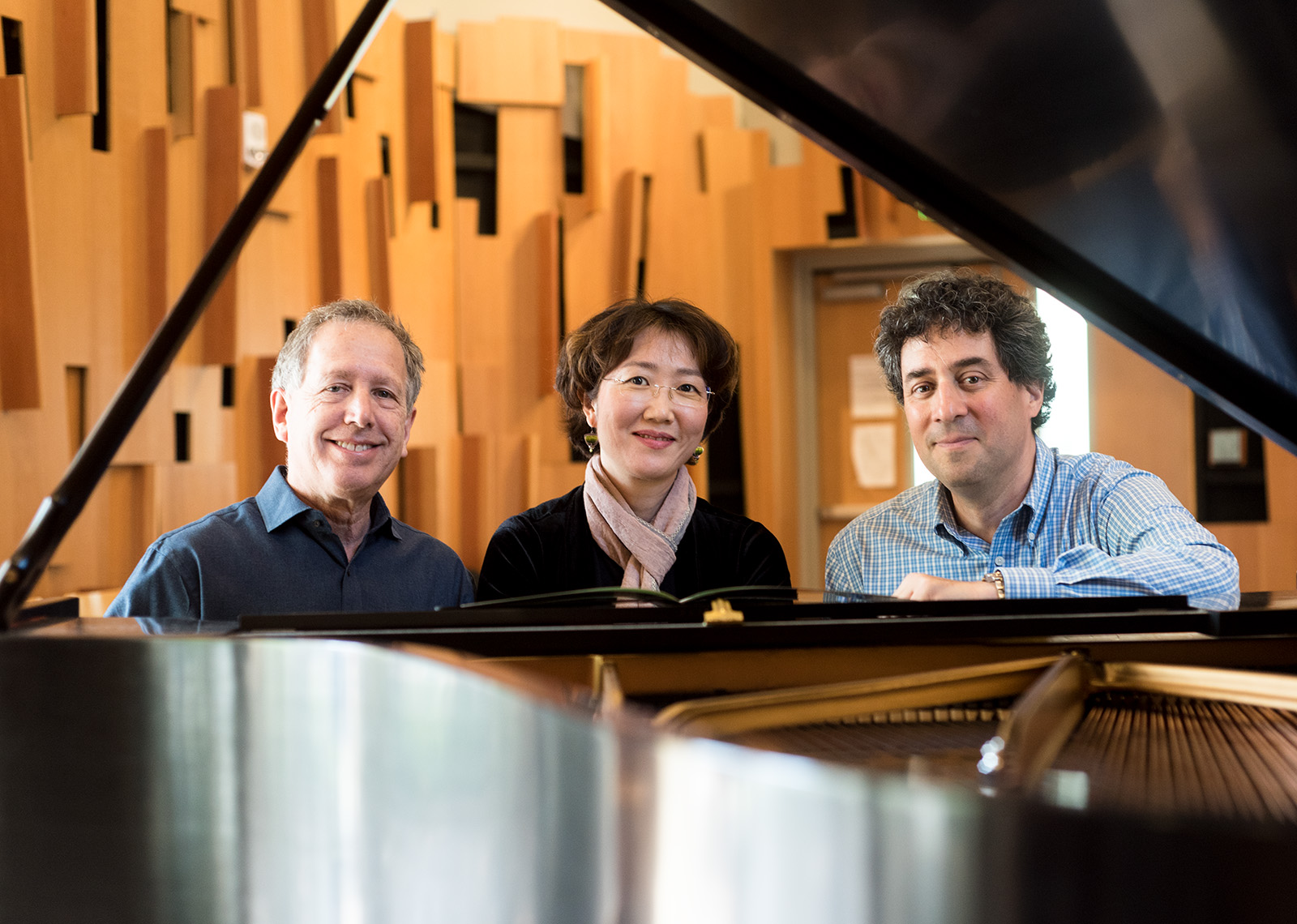Faculty composers to showcase musical pieces inspired by poems, nature

Faculty members Peter Golub, Kay Rhie and David Lefkowitz (left to right) will perform their original compositions Tuesday in Schoenberg Hall. Golub said faculty concerts allow composition students to see their teachers as practitioners.(Isra Ameen/Daily Bruin)
By Hannah Ferguson
May 1, 2018 12:30 a.m.
Faculty composers will present their original works at a concert Tuesday, showcasing a myriad of inspirations from birchwood trees to poetry.
The works of members of UCLA’s composition faculty will be played in Schoenberg Hall. Peter Golub, an adjunct professor of composition and film music, said faculty concerts allow students to experience a range of musical compositions created by their teachers. The concert highlights the diversity of music produced by the UCLA composition faculty.
“Concerts like this are important because it’s a great learning opportunity,” Golub said. “It’s important to see your teachers are also practitioners.”
Golub will present his work “Threaded Dances,” which he composed for flute and piano in 2006. In composing the piece, Golub said he drew inspiration from the flute sonatas of Francis Poulenc in combination with a W. H. Auden poem titled “As I Walked Out One Evening.” Golub said he finds Auden’s poem profound because of its juxtaposition of romantic and dark elements.
“(‘Threaded Dances’) is not a literal depiction of (the) poem, but it’s informed by the sensibility of it, structurally the way he juxtaposes one way of looking at his subject and then harshly cuts to something else, as if it’s a movie,” Golub said.
Kay Rhie, an assistant professor in composition and music theory, also used poetry in the composition process for her song cycle entitled “I Hear the Sound of Trees.” Rhie used three poems by A.R. Ammons and two by Walt Whitman as lyrics to her song cycle.
Rhie initially wrote the final piece of the song cycle for a soprano singer while she was at an artist’s colony in Canada in 2006. While living at the colony, Rhie said she drew inspiration from the surrounding environment, which consisted mainly of birchwood trees, informing the slow, meditative nature of the song cycle’s final piece.
Rhie altered her original score for Tuesday’s performance. The piece was first performed by a quintet of musicians accompanying a soprano, but Rhie arranged the new rendition for a tenor and a pianist. She said she wanted to expand the dialogue between the singer and the pianist by changing what instruments were in the piece, thereby forcing the piano to reproduce the orchestral quality the original quintet had.
“As I was writing it, I was interpreting the text from my perspective as a female composer,” Rhie said. “This time, when the tenor is singing it, I feel like I’m hearing the poet because these were male poets.”
At the performance, Rhie said she wants her audience to brace themselves for music that might not necessarily sound beautiful. Parts of her song cycle abruptly jump from note to note, but Rhie said it reflects the chaotic nature of modern life.
David Lefkowitz, a professor of composition and music theory, said the nature of his piece may cause the audience to think it will be dissonant and unpleasing to the ear. Lefkowitz’s piece entitled “Partita-in-Progress,” is atonal, meaning it is neither in a major nor minor key. Lefkowitz said audiences might assume atonal music is discordant or ugly, but his piece maintains a melodic quality, which the audience might not expect.
Lefkowitz composed the piece, which will include three movements inspired by Johann Sebastian Bach’s flute partitas, over the last four weeks. He is still in the process of finalizing a fourth movement. Throughout the composition process, Lefkowitz said he has had to ensure that his work was physically possible for the instrumentalist to perform due to the constraints of the instrument.
“It gets to be very difficult to play, which means for a composer it can be very difficult to write,” Lefkowitz said. “You really have to think about how the violin works and make sure that what you’re writing is possible.”
Lefkowitz said live performances of difficult music like his offer much more than recorded works, as a challenging piece may sound easy on a recording through editing and multiple takes. Faculty concerts allow students to see the practical applications of theory learned in the classroom, and how expectations might not always line up with reality, Lefkowitz said.
“When you see performers onstage, you see them accomplishing some things that you imagined were impossible and struggling with some things that you imagined were easy,” Lefkowitz said.


